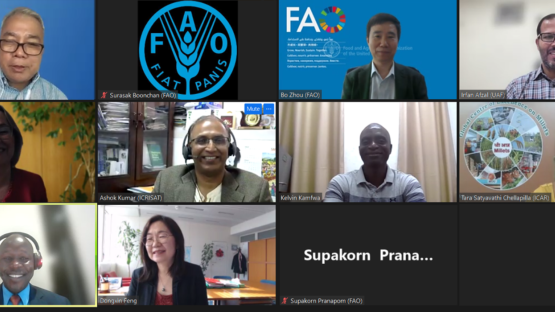To address the pressing issues of global food insecurity and malnutrition, the "International technical webinar on enhancing agri-food systems through climate-smart and nutrition-dense crops took place on 25 April 2024. The webinar was the outcome of a collaboration between the International Atomic Energy Agency (IAEA) through the Joint FAO/IAEA Centre of Nuclear Techniques in Food and Agriculture’s Plant Breeding and Genetic Section, and the Regional Office for Asia and the Pacific of the Food and Agriculture Organization (FAO) of the United Nations. The webinar shed light on innovative strategies centred around climate-resilient and nutrient-dense crops. The event, which drew over 130 participants from various backgrounds worldwide, underscored the urgency of integrating these crops into mainstream agricultural practices towards a resilient and sustainable agrifood system.
The webinar highlighted the alarming scope of global food insecurity, affecting a staggering 2.37 billion people worldwide, with 418 million residing in Asia alone. Micronutrient deficiencies afflict two billion individuals globally, while 77 percent of deaths in low- and middle-income countries are diet-related — an alarming testament to the urgent need for sustainable agricultural interventions.
Opening the webinar, Ms. Dongxin Feng, Director of the Joint FAO/IAEA Centre, emphasized the need for innovative strategies, heightened investments, and inclusive partnerships to tackle global agrifood challenges. She asserted that 'Science, technology, and innovation (STI), including nuclear and isotopic techniques, are key in addressing such challenges. An exemplary application of STI is plant mutation breeding, a combination of radiation-based techniques and biotechnology, which can speed up the plant mutation process, resulting in the development of crop varieties with improved yield, disease resistance, and nutritional quality. The webinar aims at raising awareness on the potential application of STI for improved nutritional outcomes across communities in the Asia-Pacific region and beyond.’
Among the key topics discussed were the virtues of millet, pulses and quinoa—nutrient-rich, resilient crops with low greenhouse gas emissions. These crops not only offer dietary diversity but also thrive in diverse climates, showcasing potential solutions to food security challenges. The webinar emphasized the crucial role of legumes in complementing these crops through intercropping, boosting sustainability and production on marginal lands. It also highlighted the significance of science, technology and innovation, partnerships and international collaboration and investment in mainstreaming these climate-resilient and nutrient-dense crops in the agrifood systems.
Despite the promise of climate-resilient and nutrient-dense crops, challenges persist in developing countries, ranging from limited awareness to inefficient distribution systems. To combat these obstacles, the collaborative efforts of the FAO Regional Office for Asia and the Pacific and the Joint FAO/IAEA Centre aim to bolster regional and national capacity, accelerating the integration of these crops into agricultural systems.
The webinar featured six international experts who delved into key plant breeding and seed systems advancements. The first session highlighted innovative plant breeding techniques — such as mutation induction and biotechnologies — to develop crops resilient to climate variations while packing crucial nutrients. The second session focused on cutting-edge seed production, and distribution methods and models essential for widespread adoption and agricultural resilience.
The event served as a crucial platform for advocacy, sparking dialogue and collaboration among a diverse audience. The insights shared by experts and participants alike emphasisedthe imperative of mainstreaming climate-resilient and nutrient-dense crops to combat food insecurity and malnutrition and bolster agrifood systems.






